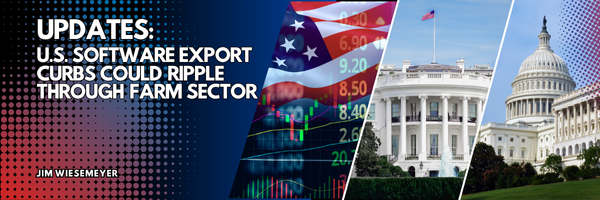
U.S. Software Export Curbs Could Ripple Through Farm Sector
Trump’s proposed restrictions on software exports to China risk triggering retaliation and still higher input costs for U.S. agriculture
President Donald Trump’s plan to tighten restrictions on “any and all critical software” exports to China — part of his broader tariff escalation set to take effect Nov. 1 — could have indirect but significant implications for the U.S. farm economy. The policy, which would block exports of software or goods made using U.S. software, is designed to curb Beijing’s access to advanced technologies but may reverberate through agriculture via trade retaliation and supply-chain costs.
Analysts warn that Beijing could respond by further targeting U.S. farm commodities, as it has in previous tariff rounds. In March, China suspended soybean import licenses for three U.S. firms and halted log imports in retaliation for earlier tariff measures, Reuters reported. Any new restrictions could again hit soybeans, corn, pork, sorghum, cotton and wheat — key U.S. exports to China.
Beyond potential market losses, the move may also raise costs across the domestic supply chain. U.S. farms rely heavily on technology built with integrated software — from precision-agriculture equipment and sensors to data-driven fertilizer systems. Limiting software trade could disrupt global supply chains or increase prices for critical components.
While the full impact will depend on the scope of the export controls and China’s response, farm economists say the uncertainty alone may deter investment and complicate crop-planning decisions already stressed by weak margins and volatile markets. “Agriculture sits on the fault line between technology and trade,” said one Midwestern analyst. “When either side shakes, farmers feel it first.”


